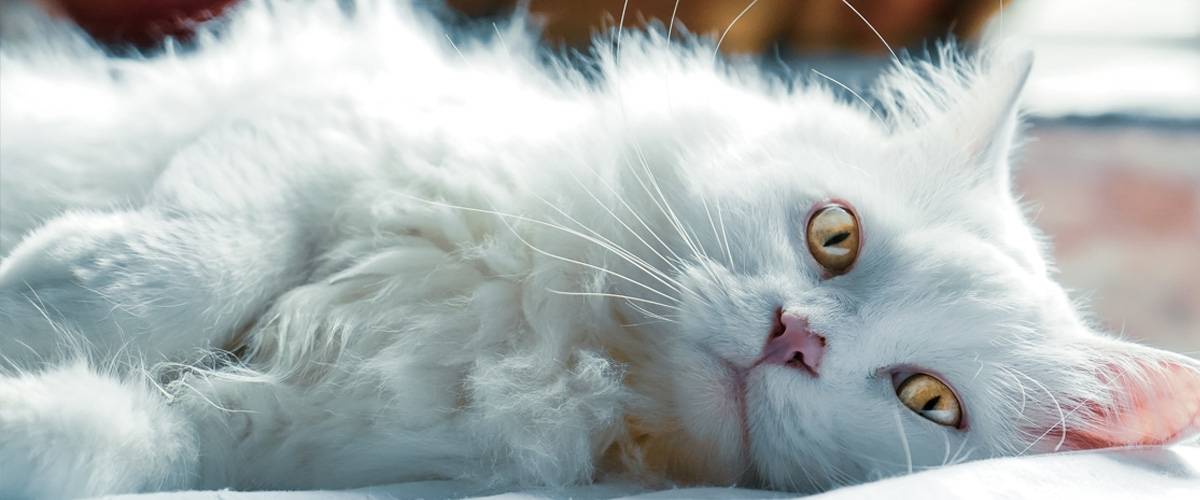
October 19, 2021 – Morris Animal Foundation has funded feline health studies for more than 70 years to improve the health and well-being of cats everywhere. We’ve contributed to the development of the first vaccine for feline leukemia, pioneered cat genetic research and improved the health and welfare of shelter cats around the world. We also were among the first to recognize and invest in better pain management for cats.
Read on for a two-year snapshot of our funded feline health studies and learn how we’re working to improve the care and well-being of our furry friends.
BACTERIAL DISEASE
Develop a highly sensitive test to diagnose Bartonella bacteria, associated with a wide spectrum of debilitating diseases in cats and other species.
BEHAVIOR & AGING
Study how age-related chronic inflammation affects cognition, behavior and overall health and well-being of senior cats.
COVID-19
Investigate the long-term effects of the COVID-19 pandemic on the behavior and well-being of cats as well as the human-animal bond.
DIABETES
Generate a map of the biological networks of gut microbiota and metabolic pathways associated with diabetes mellitus to help inform the discovery of new treatments.
DIARRHEA
Study the gut microbiome (bacterial communities) in kittens with diarrhea to inform development of novel preventives and treatments, including prebiotics and probiotics.
DRUG DOSING
Study differences between how cats and dogs process drugs in the stomach and intestine to improve oral drug selection and dosing for cats.
GENERAL HEALTH
Review six years of cat health insurance data to identify common and high-risk conditions for mixed-breed and pure-breed cats.
HEART DISEASE
Create a model that mirrors the blood environment to investigate devastating clot formations associated with hypertrophic cardiomyopathy, the most common feline heart disease.
Look for a shared genetic origin of hypertrophic cardiomyopathy in the general cat population to help inform the development of novel testing and identify new drug therapy targets.
INFLAMMATORY DISORDERS
Assess blood levels of a potential biomarker of feline inflammatory disorders affecting the small intestine, pancreas and liver.
LIVER DISEASE
Develop blood tests to diagnose a recently discovered hepadnavirus, a pathogen suspected to cause liver disease in cats, including liver cancer and chronic hepatitis.
OBESITY
Investigate whether the gut microbiome influences the success of dietary interventions for weight loss in obese cats.
Assess the efficacy of fecal microbiota transplantation as an adjunctive therapy for weight loss.
ORAL CANCER
Evaluate the safety and effectiveness of a promising new treatment for oral squamous cell carcinoma, a common and aggressive oral tumor.
OSTEOARTHRITIS
Evaluate the effect of blocking a key protein involved in fat metabolism that may help improve quality of life for cats with osteoarthritis.
Investigate if chronic pain associated with osteoarthritis has a neuropathic pain component that can be modulated by pleasant and unpleasant sensory stimuli.
RINGWORM
Develop a rapid diagnostic test for ringworm, a highly contagious fungal disease, and the most common skin disorder in cats worldwide.
SKIN DISEASE
Study how a bacterium stimulates the immune system to help combat feline atopic syndrome, an extremely common skin disease affecting up to 33% of cats seen by dermatology specialty practices.
SPAY SURGERY
Investigate the anesthetic and analgesic effects of an opioid-free or an opioid-sparing protocol in cats undergoing spay surgery.
TICK-BORNE DISEASE
Establish a culture system to grow and study Cytauxzoon felis, an emerging tick-borne parasite that causes life-threatening illness if not promptly treated.
Study the disease process and immune function of cats impacted by Cytauxzoon felis to help improve diagnostics and treatments.
VACCINE
Develop a new three-in-one core vaccine that is safe and can provide superior protection against feline herpesvirus-1 (FHV-1), feline calicivirus (FCV) and feline panleukopenia virus (FPV).




